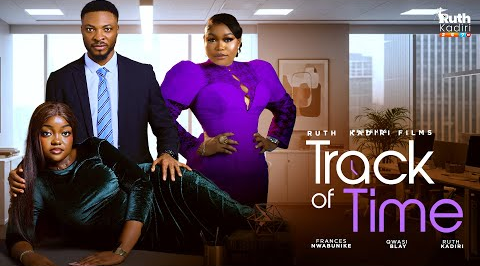The Boss, The Boyfriend, and The Billionaire Twist
Track of Time is a film that demands your patience and rewards it—albeit sometimes frustratingly—with one of the most compellingly volatile performances in recent Nollywood history. Running a hefty two hours plus, the movie attempts to merge the high-stakes world of corporate harassment with classic relationship melodrama, adding a final, earth-shaking family secret that changes everything we thought we knew. But does this ambitious mix of genres—from office thriller to psychological portrait—actually hold together? The answer, like the relationship at the film’s core, is complicated.
Nollywood veteran Ruth Kadiri (Lucy) steps into the role of the antagonist, delivering a performance so calculated and chilly it defines the movie’s entire atmosphere. Lucy is the powerful, obsessive boss who makes life a living hell for her subordinate, Mace (Kwasi Blay), not because he’s incompetent, but because she desires him. This isn’t a subtle flirtation; it’s an immediate, aggressive assertion of power. While this setup is instantly gripping, the film’s major flaw lies in its structural management of its own runtime and its reliance on a twist that feels less like a narrative payoff and more like a convenient plot detonation.
The Narrative Engine: Pacing and the Problem with the Big Reveal
The first half of Track of Time operates as a tense, slow-burn psychological drama. We watch Mace squirm under Lucy’s relentless professional and personal siege, and we watch his home life with Dora (Frances Nwabunike) deteriorate under the weight of his secrecy and her justified suspicion. The runtime, however, feels utterly inflated. Scenes meant to establish the mundane stress of Dora and Mace’s life often stretch too long, sacrificing tension for melodrama. A more ruthless editorial hand could have shaved 20 minutes off the first hour without losing any vital character development.
The Unearned Plot Twist: Mace’s Secret Identity
The major turning point—the grand reveal that Mace is actually the CEO’s son, living a simple life to vet women for authenticity—is the narrative’s biggest misstep. While conceptually intriguing, the execution feels manipulative rather than earned.
A good twist should re-contextualize prior events; this one merely excuses them. Mace’s passivity in the face of harassment, which we interpreted as a sign of his powerlessness, is suddenly framed as a conscious “test” of his girlfriend, Dora. This cheapens the earlier, genuinely uncomfortable workplace drama. We spent an hour agonizing over a man being professionally and personally destroyed, only to find out he held the ultimate “get out of jail free” card the entire time. It shifts the story’s moral center from a critique of power dynamics to an exploration of wealthy cynicism.
Despite this, the twist successfully escalates the conflict in one crucial way: it fuels Lucy’s pathology. The rejection from a subordinate was bearable; the rejection from the future owner of the company, who was merely slumming it in her department, is an intolerable, humiliating blow that sends her obsession into dangerous overdrive.
Character Battle Royale: Lucy, Mace, and Dora
The success of Track of Time rests entirely on the shoulders of its performers, and specifically, on the terrifying pathology of its villain.
Ruth Kadiri’s Lucy: The Pathological Performer
Ruth Kadiri’s portrayal of Lucy is the film’s magnetic core. Lucy is not a cartoon villain; she’s an intricate study in the toxic intersection of professional power and personal emptiness.
The inclusion of her therapy sessions is a fascinating, yet risky, choice. These scenes, where Lucy discusses her pattern of going after “taken” men and her crippling fear of rejection, attempt to humanize her compulsion. The film successfully uses this context not to excuse her actions, but to explain them pathologically. We see her high-functioning corporate mask crack under the weight of her emotional distress. She uses her wealth and status as a shield against vulnerability, and when Mace threatens that shield, her pursuit becomes a matter of life or death for her ego. Kadiri masterfully balances Lucy’s razor-sharp professional acumen with the desperate, petulant rage of a child who can’t have the toy she wants.
The Fault Lines: Mace and Dora
Unfortunately, the protagonists struggle to match Lucy’s three-dimensional intensity.
Mace (Kwasi Blay): Mace is written primarily as a reactive plot device. His core motivation—the “authenticity test”—makes him inherently dishonest and, frankly, tedious. He spends the majority of the film unable to communicate effectively with Dora or stand up decisively to Lucy, traits that are frustrating even before the grand reveal. After the reveal, his behavior feels inexcusable.
Dora (Frances Nwabunike): Dora is stuck in the thankless role of the suspicious, jealous girlfriend. While her suspicion is completely justified by Mace’s secrecy and Lucy’s public harassment, her character arc doesn’t extend much beyond escalating emotional distress. She embodies the collateral damage of Mace’s experiment, but the script fails to give her the depth needed to truly make us invest in her suffering.
Standout Scene: The emotional zenith occurs during the explosive confrontation in Mace and Dora’s apartment, right before the CEO twist. The raw, screaming argument—where Dora lays out her absolute humiliation and Mace is forced into silence by his secret—is genuinely gut-wrenching and feels like two real people burning their life down.
Scene That Fell Short: The single, intimate scene between Mace and Lucy feels entirely misjudged. It’s filmed as a moment of genuine, albeit twisted, connection, but given the preceding context of continuous sexual harassment, it comes across as confusingly consensual and undercuts the severity of Lucy’s coercive tactics.
Thematic Tensions: Wealth, Work, and Mental Health
A Tepid Critique of Workplace Toxicity
Track of Time initially sets itself up as a sharp critique of workplace harassment, exploring how money, power, and gender can be weaponized. However, the film pulls its punches. By making Mace the CEO’s son, the narrative ultimately absolves him of the real pain of being powerless. The theme shifts from “how do we protect the exploited?” to “will the rich heir learn his lesson?”
The film is far more effective in its portrayal of Lucy’s abuse of power. The way she leverages company resources, shifts deadlines, and demands unreasonable commitments to isolate Mace provides a chillingly realistic look at how professional structures can facilitate personal vendettas.
The Myth of Authenticity and Class
The theme of wealth and authenticity—Mace hiding his status to find “true love”—is worn thin by decades of rom-coms, and Track of Time doesn’t offer a fresh perspective. Mace’s experiment is ethically dubious. He doesn’t just withhold information; he actively places Dora in a crucible of stress, leading to immense psychological damage, all to satisfy his quest for a partner who isn’t after his money. The film unintentionally reinforces the idea that the super-rich are fundamentally incapable of finding sincerity, justifying their paranoid, manipulative games.
The film’s exploration of mental health through Lucy is its most nuanced theme. It recognizes her behavior as a symptom of deeper psychological trauma (rejection, compulsion) rather than pure malice. While not a perfect or sensitive portrayal, it elevates the villain beyond a simple foil, framing the conflict as a destructive collision between a woman’s wealth-fueled pathology and a man’s self-imposed, wealth-fueled deception.
Technical and Directional Merit
For a Nollywood drama of this scope, the production quality is generally robust. The cinematography is glossy, successfully creating a visual contrast between Lucy’s opulent office and penthouse (all sharp glass and cold steel) and Mace and Dora’s warm, cozy, but increasingly suffocating apartment. The film successfully uses locations to convey status and setting.
The direction, however, often errs on the side of melodrama. Director Charles Uwagbai attempts to match the intensity of the emotional script with equally intense visual cues, resulting in several over-the-top reaction shots and drawn-out confrontations that needed tighter editing to land their punch.
Finally, the recurring romantic theme song used throughout the film is perhaps the most repetitive technical choice. Intended to be an emotional anchor for Mace and Dora’s relationship, it quickly becomes a repetitive distraction, cued at moments that feel less tender and more manufactured.
My Verdict: Should You Spend Time on Track of Time?
Track of Time is a deeply flawed but utterly engaging film. Its core strength lies in Ruth Kadiri’s commanding and chilling portrayal of a powerful woman consumed by obsession, and its ambitious attempt to tackle complex themes of power and pathology. Its weakness is a structural one: the bloated pacing and the inclusion of the “CEO’s son” twist, which ultimately undermines the stakes and moral weight of the initial workplace harassment narrative.
This is not a clean, tidy narrative, but it is a compelling one. If you are a fan of intense, character-driven Nollywood dramas—especially those featuring strong, if ethically bankrupt, female antagonists—this film is worth the watch simply for the performance and the sheer ambition of its plot.
Recommendation: Worthwhile watch for committed Nollywood fans seeking a high-drama, performance-heavy psychological thriller. Skip if you prefer streamlined plots and morally unambiguous heroes.
Score: …………………..3 (3/5 Stars)
What did you think of the twist? Did Mace deserve what he got for his “authenticity test?” Let me know your thoughts in the comments below!
#NollywoodTimes
#WorkplaceObsession
#Nollywood
#TrackOfTime














Leave a Reply